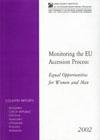Monitoring the EU Accession Process, 2002
During the first phase of the program (2001-2002) was published the first report Monitoring the European Accession Process: Equal Opportunities for Women and Men. An assessment of the status of equal opportunities, de jure and de facto, was carried out in seven of the candidate countries: Bulgaria, the Czech Republic, Estonia, Hungary, Lithuania, Poland and Romania, and the EU Directives on equal opportunities provided the framework for monitoring and analyzing the corresponding legislation, institutions and practices. The Directives related to the principle of equal pay for work of equal value; equal treatment as regards employment, protection of pregnant, breastfeeding women and women who recently gave birth, the burden of proof in cases of sex-based discrimination and non-discrimination against part-time workers were analyzed in 2001; while the remaining Directives on self-employed workers, parental leave, and social security schemes were assessed in 2002.
The Program Director, with the assistance of an expert working group comprised of experts from Western and Eastern Europe, devised the methodology based on the content of the EU Directives and EU case laws. The experts were also charged with supervising the completion of the Monitoring Reports by the national experts. Questions related to each specific Directive were issued, addressing key aspects from a legal, conceptual and factual point of view. The research was carried out in each candidate country by teams of local experts from various backgrounds: lawyers, sociologists, scholars, women’s rights advocates from local NGOs or international agencies or from trade unions. Throughout the project, debates were organized within each country to enable a discussion and critique of the draft reports, sections of which were discussed with different constituencies and presented to the European Commission.
The findings of the reports illustrate how women’s human rights and equal opportunities for women and men are perceived in the candidate countries, all of whom have undertaken several steps in order to comply with EU standards, adopting a host of new laws and in most cases amending their Labor Codes. The overall assessment is that the EU accession is a positive process for raising social standards, and standards on gender equality in particular. The process has primarily influenced legislation in the field of employment, specifically equal pay and access to employment, the establishment of gender equality institutions and special legislation. The shift in the burden of proof and the adoption of provisions on parental leave provisions can be seen in some countries, as can the removal of certain measures that claim to be protective towards women, but which are in fact discriminatory.
This critical assessment is valid despite the fact that as of June 2002 all of the countries under review had already closed Chapter 13 “Employment and social policy” of the negotiation process. The Chapter was closed with certain conditions dictated by the Commission for these countries, including in the field of gender equality. The fulfillment of these conditions must be thoroughly monitored by the European Commission, the European Parliament and the NGOs in the countries in accession.
The country reports published in the fall of 2002 contain the latest information available as of 15 July 2002 and provide concrete recommendations on how to ensure full compliance with all of the Directives and outlines specific areas of concern.
The elaboration of the first report for Bulgaria was coordinated by the European Institute Foundation and the working group included a variety of experts from the state administration and the non-governmental sector. The report for Bulgaria presents the main findings as well as recommendations for the implementation of each Directive.
The full report for all countries, the report for Bulgaria as well as the introduction and overview in English can be found below.
 Introduction.pdf(93.33 Kb) Introduction.pdf(93.33 Kb)
 Overview.pdf(284.9 Kb) Overview.pdf(284.9 Kb)
 Bulgaria.pdf(327.08 Kb) Bulgaria.pdf(327.08 Kb)
 BulgariaES.pdf(108.84 Kb) BulgariaES.pdf(108.84 Kb)

|



 Programs
Programs Gender Equality Monitoring Agency
Gender Equality Monitoring Agency Equal Opportunities for Women and Men
Equal Opportunities for Women and Men Equal Opportunities for Women and Men Monitoring Program
Equal Opportunities for Women and Men Monitoring Program
 Introduction.pdf
Introduction.pdf
